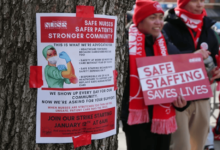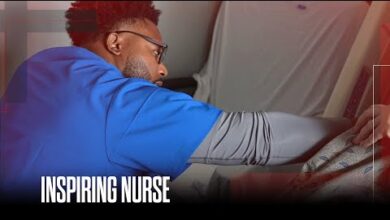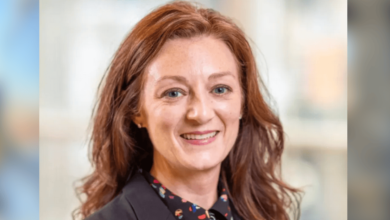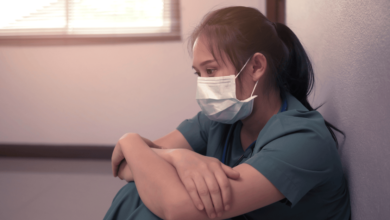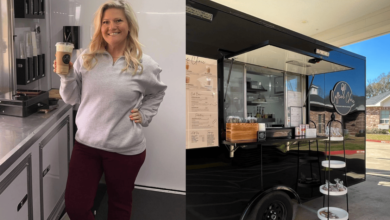Endometriosis: report calls for better nurse training

Nurses must be better trained to spot the signs of endometriosis, a new report has said, as delayed diagnoses rise.
Charity Endometriosis UK has today published a series of recommendations to UK health authorities on how to reduce the almost decade-long average wait to get an endometriosis diagnosis, and mitigate the harm this causes.
“People don’t turn up to casualty willy nilly, or take painkillers unless they’re in pain the majority of the time”
Liz Bruen
Diagnosis speeds in all four UK countries, the report said, had worsened between 2020 and 2023. UK-wide, the average length of time to obtain a diagnosis was found to be eight years and 10 months, up from eight years in 2020.
In Wales, the average length rose by almost a year, from nine years in 2020 to nine years and 11 months.
Endometriosis UK’s report concluded that all healthcare professionals, but particularly nurses, should receive more specific education and training on menstrual health and endometriosis awareness.
It recommended that menstrual health and endometriosis were put on all professional health courses, and that royal colleges and professional bodies should improve the provision of ongoing training on these topics.
In particular, the report said, nurses, accident and emergency (A&E) practitioners, community pharmacists, gynaecologists and GPs should be up-skilled on endometriosis.
Endometriosis is a chronic condition in which extra tissue similar to womb lining grows in the ovaries or fallopian tubes. It can cause extreme pain, as well as additional bleeding and other symptoms such as nausea and vomiting.
Liz Bruen, an endometriosis specialist nurse in Wales, agreed that the disease – and menstrual health in general – should be better taught during nurse training.
However, Ms Bruen said it should also be included in continued professional development training for all healthcare professionals.
“There needs to be an awareness raised, even long after you finish your training, be you a nurse, psychologist, GP, etc,” she told Nursing Times.
“This needs to happen so when a patient comes in, there are triggers which makes you think – this is endometriosis.
“The issue is that people confuse it with other things.”
The report said Covid-19 made waiting times worse, but found that gynaecological waiting times increased by the highest percentage of any speciality across the pandemic.
Ms Bruen agreed that gynaecology and menstrual health had historically always been the worst hit when resources were cut or redeployed.
Endometriosis UK’s report said that National Institute for Health and Care Excellence (NICE) guidance on endometriosis, published 2017, was not being followed entirely across the nation.
It recommended that NHS commissioners and providers should “urgently” work to drive down wait times in gynaecology, implement the NICE guidance in full, and that the UK Government should invest in public health campaigns to raise awareness about the disease.
This awareness, the report said, would help patients recognise the symptoms, and hopefully improve their experience when they seek help from health professionals.
Endometriosis UK heard from patients who felt they had been ignored, patronised and frequently told that their severe pain or other symptoms were “normal” parts of a period.
Further, the report called for better research into the causes of endometriosis, improved treatments and funding for better diagnostic methods.
Ms Bruen said her own experience in practice mirrored the findings of the report, and in particular the issues raised by people with endometriosis feeling ignored.
“It’s the trigger words, somehow we need to incorporate a subconscious response that when someone turns up and is on their period in horrific pain, particularly if not the first time, there is something going on,” she continued.
“It’s not because they are seeking attention or just not coping.
“People don’t turn up to casualty willy nilly, or take painkillers unless they’re in pain the majority of the time.”
“[Specialist nurses] are a first step, but we need to facilitate their development”
Liz Bruen
Ms Bruen said investing in endometriosis training, and more menstrual and gynaecology healthcare staff such as specialist nurses like her, would benefit the entire healthcare system.
She pointed to the reduction in A&E admissions seen when asthma nurses were in place, and said that more endometriosis specialist nurses could help in a similar fashion.
Currently, there are only a very limited number of these nurses in the UK.
The Welsh Government, since 2021, has funded one per health board in the country.
Ms Bruen said that while this was a positive change in Wales, it should only be the beginning of improving care for people with the disease and that the whole healthcare community must become more educated on endometriosis.
“It’s a chronic condition and [patients] need to be managed in primary care as well as secondary care,” she added.
“[Specialist nurses] are a first step, but we need to facilitate their development.
“I still passionately believe the basic skills of nursing will help you identify someone who really needs our help and it’s a matter of empowering those skills and allowing people time to be able to do that.”
She said women “deserve a quality of life, they deserve a sex life”, adding: “They deserve to be able to go to the toilet without having to scream or vomit because it feels like they’re peeing glass.”



